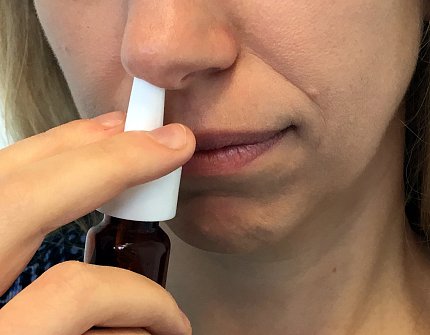Intranasal Flu Vaccine Spurs Strong Immune Response

Photo: NIAID
An experimental single-dose, intranasal influenza vaccine was safe and produced a durable immune response when tested in a phase 1 study, published in the Journal of Clinical Investigation.
The investigational vaccine, called Ad4-H5-VTN, is a recombinant, replicating adenovirus vaccine designed to spur antibodies to hemagglutinin, a protein found on the surface of influenza viruses that attaches to human cells.
Developed by Emergent Biosolutions Inc. in Gaithersburg, Md., the investigational vaccine was administered intranasally (28 study participants), as an oral capsule (10 participants) and via a tonsillar swab (25 participants) to healthy men and nonpregnant women ages 8 to 49.
Participants who received the vaccine intranasally or via tonsillar swab showed significantly higher H5-specific neutralizing antibody levels compared to the group receiving the vaccine capsule orally. The participants who received the intranasal vaccine shed viral DNA for 2 to 4 weeks, but virus could be cultured for a median of only 1 day.
Volunteers who received the intranasal vaccine had high levels of serum neutralizing antibodies at 26 weeks after vaccination, and this level was unchanged at 3 to 5 years after a single intranasal dose of the vaccine. The duration of viral shedding correlated with a high magnitude of neutralizing antibody response at week 26. The intranasal vaccine induced a mucosal antibody response in the nose, mouth and rectum.
The study authors speculate that replication-competent vector vaccines may have advantages over other types of vaccines because they can express viral proteins at higher levels and for longer durations.
Additionally, this type of vaccine induces a mucosal immune response that is critical for limiting transmission of viruses that infect mucosal tissues.
The study authors said this vaccine platform could be highly adaptable for use against other viruses, including HIV and SARS-CoV-2.
